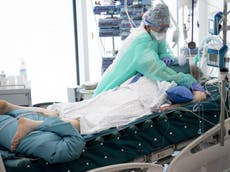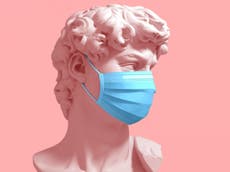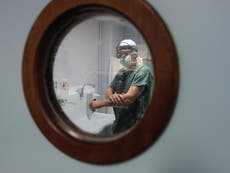If you think NHS workers have it bad, just look at the people who equip them
On the other side of the world are people who work – most of them under terrible conditions, many by force – to manufacture medical equipment for the UK

Coronavirus has made it obvious to all that people like doctors, nurses and care workers are heroes. Crisis or no, they keep society going, without glamour, gratitude or great pay.
On the other side of the world, there are other heroes keeping Britons safe. People who work harder and for less reward than almost anyone in the UK. They’re the workers making the medical gloves we so desperately need.
Most come from the poorest countries in Asia: Nepal, Myanmar, Vietnam, Cambodia, Indonesia. Typically, they meet a recruiter in their hometown and borrow money from friends and family to fly to Malaysia or Thailand, the slightly wealthier countries where medical gloves are made, and where millions of migrant workers do what are known as “3D jobs” – dirty, dangerous and difficult.
Once there, they usually settle into unhygienic dorms with up to 30 or 40 colleagues. They often sign a contract promising to work for a minimum period, which can be up to three years. To ensure they don’t change their mind, their passports are often taken away. This is forced labour.
The work itself is hard. The first step is mixing chemicals including toxic chlorine gas. Ironically, workers often aren’t provided with the kind of protective equipment that they spend all day making.
After the chemicals are mixed and moulded, the gloves are sprayed with hot water and dried in an oven. It’s hot. Temperatures are often above 45 degrees celsius, sometimes up to 70.
With all this heat, fires are common; between 2009 and 2015, there were at least eleven. The factory is loud. Machines can reach 100 decibels, as loud as a motorbike. The pace of work is fast. Some workers have been forced to urinate at their workstations to keep up, and sometimes faint when they can’t.
If workers are not happy, they can’t complain. In both Thailand and Malaysia, foreign workers have fewer labour rights than locals. In Sri Lanka, the world’s third-largest glove producer, a local union president was attacked in 2013 by two men on a motorbike. The company then sacked the man along with ten of his union colleagues. When 281 workers went on strike in solidarity, they were all sacked too. They were only reinstated after a three-year international campaign.
Coronavirus has made the situation worse. Demand for medical gloves has rocketed, as have owners’ profits and the companies’ share prices. For workers, though, it has led to longer shifts and fewer (often no) days off.
Coronavirus itself is also something workers worry about. Malaysia has had 83 deaths, Thailand 43 and Sri Lanka 7. If the virus was to take hold, migrant workers would be at high risk. Social distancing isn’t easy when you sleep in a room with 30 people, catch a crowded bus to a busy factory and eat lunch in a canteen.
Of course, you can take this logic further. There are millions of people all over the world who are exploited to make the products we need in the UK. Even if you stay with the example of gloves, there are the people who tap rubber trees for what becomes latex. Most of these people work seven days a week, are paid less than the living wage and are exposed to dangerous pesticides.
However, progress is possible. As major customers who buy in bulk, Britain’s medical procurement agencies have huge power over their suppliers. They must use this to relentlessly investigate the working conditions at all their suppliers. And their suppliers’ suppliers. If abuses are found, they must not cut them loose straight away; that can make things worse for workers. Instead, they should use their buying power to ensure problems are fixed.
The British Medical Association campaigns against exploitation in medical manufacturing and says conditions can be improved. Look at surgical instruments, it says. Around 80% are made in the Pakistani city of Sialkot. After poor working conditions there were revealed, there was an uproar, and conditions were improved. Child labour stopped, the minimum wage was obeyed and overtime was paid. In the end, local employers grew to approve of these changes as they attracted the best workers to their factories.
Of course, medical procurement agencies have a lot on their plates right now. But when this crisis is over, they should not forget those working round the clock to make the medical kit we need. Like our nurses, doctors and care workers, they are heroes. And they deserve much, much better than they currently get.







Join our commenting forum
Join thought-provoking conversations, follow other Independent readers and see their replies